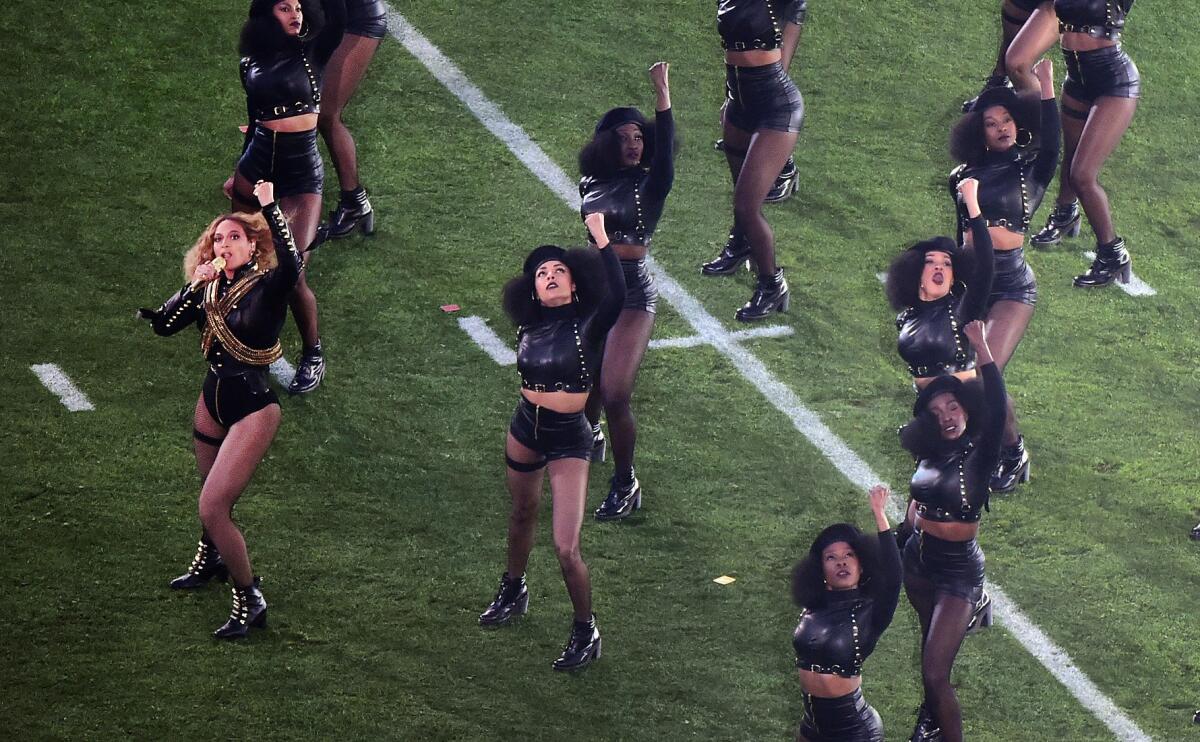From Beyoncé to De La Soul, modern black protest music got plenty of attention at the Grammys

On Tuesday morning Beyoncé became the lead nominee for next year’s Grammy Awards. The accolades came just a few months after “Formation” caused national outrage.
The single — in which she proudly sings “I like my Negro nose” — sparked controversy with its provocative music video. The artist was shown atop a submerged police car and a young boy was seen dancing in front of officers with the words “stop shooting us” spray painted on the wall behind him.
And then there was her performance at the Super Bowl.
On one of the world’s biggest stages, she delivered the black power salute, paid homage to civil rights leader Malcolm X and dressed in a militant, leather ensemble inspired by the Black Panthers and Michael Jackson.
Nearly 112 million viewers saw Beyoncé upend her public persona.
It was the rare political statement from an artist who until that moment had spent most of her career striving for pop perfection with audacious anthems of female empowerment and sexuality. Critics accused her of being anti-police, condemned her ensemble and a Tennessee sheriff even blamed her for shots fired outside his home.
Months later she dropped “Lemonade,” a bold personal work that explored pain and rage through the lens of black womanhood. The album and its hourlong companion film is nominated for nine Grammys, including album, record and song of the year (the latter two for “Formation”).
From the confrontational approach of Beyoncé and Kendrick Lamar to the jubilant gospel of Chance the Rapper and the simmering introspection of Solange, this year’s Grammy nominations are peppered with modern black protest music — works that provided the soundtrack for a new generation of young black men and women during a renewed time of racial unrest.
For as long as there’s been tumult in this country, black artists have responded with music — sounds that have influenced and shaped myriad genres — that can be traced through slavery and the civil rights era to the birth of gangster rap during Reaganomics.
Today, with fraught racial tensions, police brutality, government corruption (e.g. the water crisis in Flint, Mich.) and President-elect Donald Trump’s divisive rhetoric, there’s no shortage of topical material.
Pushing back, be it against institutionalized racism or even record labels, was a common thread among the black protest music released by Grammy nominees.
“We came from the back of the bus, talking Watts to Mobile, Now we’re on a house on a hill,” De La Soul raps on the inventive group’s “And the Anonymous Nobody.” The album, the group’s first in a dozen years, completely eschewed a traditional record business model by being exclusively funded through crowd-sourcing.
Solange spoke directly to the black experience and its nuances with her ambitious “A Seat at the Table.” Regrettably the album got largely overlooked by the Recording Academy (it’s one of the year’s most lauded albums but it arrived on the final day of Grammy eligibility). Still, she’s the one to beat in R&B performance for “Cranes in the Sky,” a beautifully uplifting anthem of catharsis.
“It’s not a coincidence that so many artists – both pop and underground or whatever – are creating art that is reflecting the times,” Solange told W Magazine. “This is the time that Donald Trump is going on television and saying black people are poor and uneducated and we don’t have anything to lose.”
Earlier this year, Chance the Rapper disrupted industry tradition when “Coloring Book” became the first streaming-only album to chart on the Billboard 200. The Chicago rapper rebuffs major labels and has yet to make his music available for purchase, releasing them to SoundCloud, free digital download or in the case of his latest, exclusively to Apple Music for a short window.
Chance declared himself the “[Harriet] Tubman of the underground” on Kanye West’s “Ultralight Beam” (it’s up for rap song and rap/sung performance) and warned major labels not to stand in his way on his banger “No Problem,” nominated for both rap song and performance.
On “Coloring Book,” Chance, also a nominee for new artist, delivered an offering of exuberant rap that was inspirational, introspective and deeply informed by gospel — a genre of black music that can be traced as far back as the 17th century.
He raps about his faith and fatherhood, but also about the Black Lives Matter movement and the gun violence that has besieged his native South Side and has contributed to a stunning number of murders.
And he’s dedicated to activism, working with a nonprofit to provide self-heating winter coats/sleeping bags for the homeless, leading a social media campaign that resulted in a cease-fire in Chicago for 42 hours and parading hundreds of young voters to the polls.
Beyoncé undoubtedly became the face of protest music this year between her Super Bowl appearance and the release of “Lemonade.”
The album’s accompanying visual — nominated for music film and a video nod for “Formation” — included poetry by Somali British writer Warsan Shire, referenced Malcolm X and featured scenes with the mothers of slain black men Trayvon Martin, Eric Garner and Michael Brown.
“Freedom” itself has emerged as a powerful rallying cry. The track invokes the Negro spiritual “Wade in the Water,” samples a reverend preaching during the Jim Crow era and has a fiery verse from Kendrick Lamar (it’s up for rap/sung performance).
“Freedom! Freedom! Where are you? Cause I need freedom too,” she sings. “I break chains all by myself, won’t let my freedom rot in hell.”
More to Read
The biggest entertainment stories
Get our big stories about Hollywood, film, television, music, arts, culture and more right in your inbox as soon as they publish.
You may occasionally receive promotional content from the Los Angeles Times.







